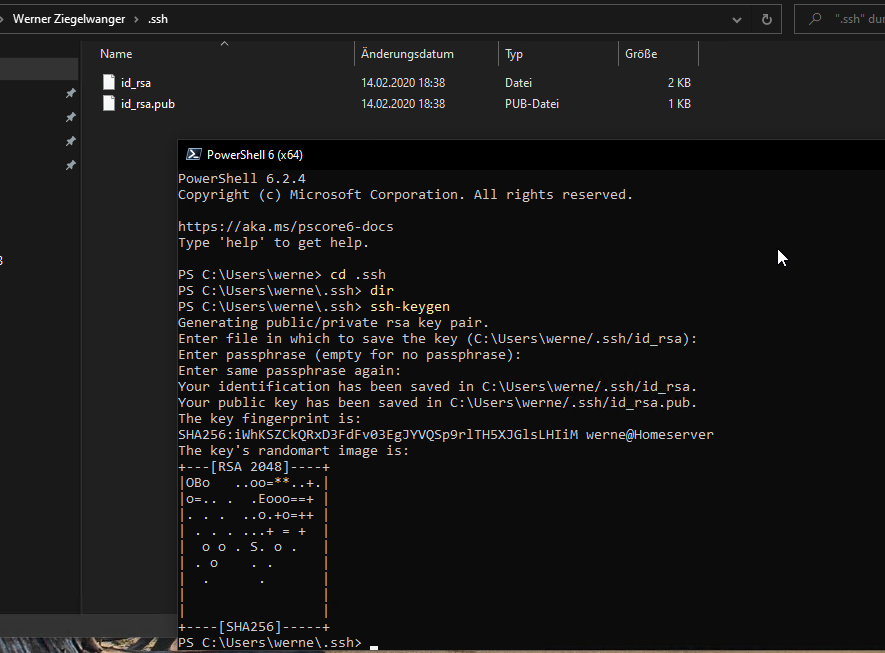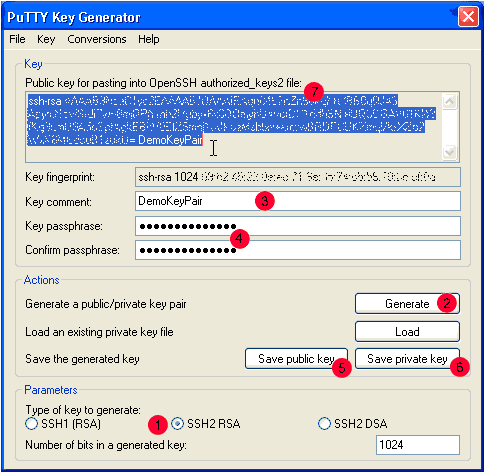I recently got a PuTTY private key sent to me that I wanted to use to log into a remote server. But, I run OpenSSH, not PuTTY.
You've used ssh-keygen to create a private key file called idrsa.ppk. However this is an OpenSSH-format private key and needs to be converted to Putty's own format to use in Putty. Openssl private key contains several modules or a series of numbers. In order to verify the private key matches the certificate check the following two sections in the private key file and public key certificate file. If they match validation is successful. Subject Public Key Info: from certificate file; Private-Key: from key file. OpenSSH comes with an ssh-agent daemon and an ssh-add utility to cache the unlocked private key. The GNOME desktop also has a keyring daemon that stores passwords and secrets but also implements an SSH agent. Ssh-agent is a program that can hold a user's private key, so that the private key passphrase only needs to be supplied once. A connection to the agent can also be forwarded when logging into a server, allowing SSH commands on the server to use the agent running on the user's desktop.
Here are the steps to convert the PuTTY private key to an OpenSSH private & public key.
Install puttygen
There’s a CLI tool to help with the conversion, it’s available on most Linux distro’s and Mac.
For Linux:
On Mac:
On Mac, I ran into the error that PuTTY isn’t compatible with pssh, so I had to run brew unlink pssh first.
Now you have a utility puttygen available.
Converting the private key from PuTTY to OpenSSH
With your private key at hand, now run the following commands.
You can put these files in your ~/.ssh folder to easily refer to them when you SSH into a machine.
With the -i flag you pass along the identity you want to use to authenticate, in this case we refer to the newly created private key.
Note

This plugin is part of the community.crypto collection (version 1.6.1).
To install it use: ansible-galaxycollectioninstallcommunity.crypto.
To use it in a playbook, specify: community.crypto.openssh_keypair.
This module allows one to (re)generate OpenSSH private and public keys. It uses ssh-keygen to generate keys. One can generate
rsa,dsa,rsa1,ed25519orecdsaprivate keys.
The below requirements are needed on the host that executes this module.
Openssh Private Key To Ppk
ssh-keygen
| Parameter | Choices/Defaults | Comments |
|---|---|---|
| attributes string | The attributes the resulting file or directory should have. To get supported flags look at the man page for chattr on the target system. This string should contain the attributes in the same order as the one displayed by lsattr. The = operator is assumed as default, otherwise + or - operators need to be included in the string. | |
| comment | Provides a new comment to the public key. | |
| force boolean |
| Should the key be regenerated even if it already exists |
| group string | Name of the group that should own the file/directory, as would be fed to chown. | |
| mode raw | The permissions the resulting file or directory should have. For those used to /usr/bin/chmod remember that modes are actually octal numbers. You must either add a leading zero so that Ansible's YAML parser knows it is an octal number (like 0644 or 01777) or quote it (like '644' or '1777') so Ansible receives a string and can do its own conversion from string into number.Giving Ansible a number without following one of these rules will end up with a decimal number which will have unexpected results. As of Ansible 1.8, the mode may be specified as a symbolic mode (for example, u+rwx or u=rw,g=r,o=r). | |
| owner string | Name of the user that should own the file/directory, as would be fed to chown. | |
| path path / required | Name of the files containing the public and private key. The file containing the public key will have the extension .pub. | |
| regenerate string |
| Allows to configure in which situations the module is allowed to regenerate private keys. The module will always generate a new key if the destination file does not exist. By default, the key will be regenerated when it does not match the module's options, except when the key cannot be read or the passphrase does not match. Please note that this changed for Ansible 2.10. For Ansible 2.9, the behavior was as if full_idempotence is specified.If set to never, the module will fail if the key cannot be read or the passphrase isn't matching, and will never regenerate an existing key.If set to fail, the module will fail if the key does not correspond to the module's options.If set to partial_idempotence, the key will be regenerated if it does not conform to the module's options. The key is not regenerated if it cannot be read (broken file), the key is protected by an unknown passphrase, or when they key is not protected by a passphrase, but a passphrase is specified.If set to full_idempotence, the key will be regenerated if it does not conform to the module's options. This is also the case if the key cannot be read (broken file), the key is protected by an unknown passphrase, or when they key is not protected by a passphrase, but a passphrase is specified. Make sure you have a backup when using this option!If set to always, the module will always regenerate the key. This is equivalent to setting force to yes.Note that adjusting the comment and the permissions can be changed without regeneration. Therefore, even for never, the task can result in changed. |
| selevel string | This is the MLS/MCS attribute, sometimes known as the range.When set to _default, it will use the level portion of the policy if available. | |
| serole string | When set to _default, it will use the role portion of the policy if available. | |
| setype string | When set to _default, it will use the type portion of the policy if available. | |
| seuser string | By default it uses the system policy, where applicable.When set to _default, it will use the user portion of the policy if available. | |
| size integer | Specifies the number of bits in the private key to create. For RSA keys, the minimum size is 1024 bits and the default is 4096 bits. Generally, 2048 bits is considered sufficient. DSA keys must be exactly 1024 bits as specified by FIPS 186-2. For ECDSA keys, size determines the key length by selecting from one of three elliptic curve sizes: 256, 384 or 521 bits. Attempting to use bit lengths other than these three values for ECDSA keys will cause this module to fail. Ed25519 keys have a fixed length and the size will be ignored. | |
| state string |
| Whether the private and public keys should exist or not, taking action if the state is different from what is stated. |
| type string |
| The algorithm used to generate the SSH private key. rsa1 is for protocol version 1. rsa1 is deprecated and may not be supported by every version of ssh-keygen. |
| unsafe_writes boolean |
| Influence when to use atomic operation to prevent data corruption or inconsistent reads from the target file. By default this module uses atomic operations to prevent data corruption or inconsistent reads from the target files, but sometimes systems are configured or just broken in ways that prevent this. One example is docker mounted files, which cannot be updated atomically from inside the container and can only be written in an unsafe manner. This option allows Ansible to fall back to unsafe methods of updating files when atomic operations fail (however, it doesn't force Ansible to perform unsafe writes). IMPORTANT! Unsafe writes are subject to race conditions and can lead to data corruption. |
Begin Openssh Private Key
Note
In case the ssh key is broken or password protected, the module will fail. Set the force option to
yesif you want to regenerate the keypair.Supports
check_mode.
Begin Openssh Private Key

Common return values are documented here, the following are the fields unique to this module:
| Key | Returned | Description |
|---|---|---|
| comment string | changed or success | Sample: |
| filename | changed or success | Path to the generated SSH private key file. /tmp/id_ssh_rsa |
| fingerprint string | changed or success | Sample: SHA256:r4YCZxihVjedH2OlfjVGI6Y5xAYtdCwk8VxKyzVyYfM |
| public_key string | changed or success | Sample: ssh-rsa AAAAB3Nza(...omitted...)veL4E3Xcw test_key |
| size integer | changed or success | Sample: |
| type | changed or success | Algorithm used to generate the SSH private key. rsa |
